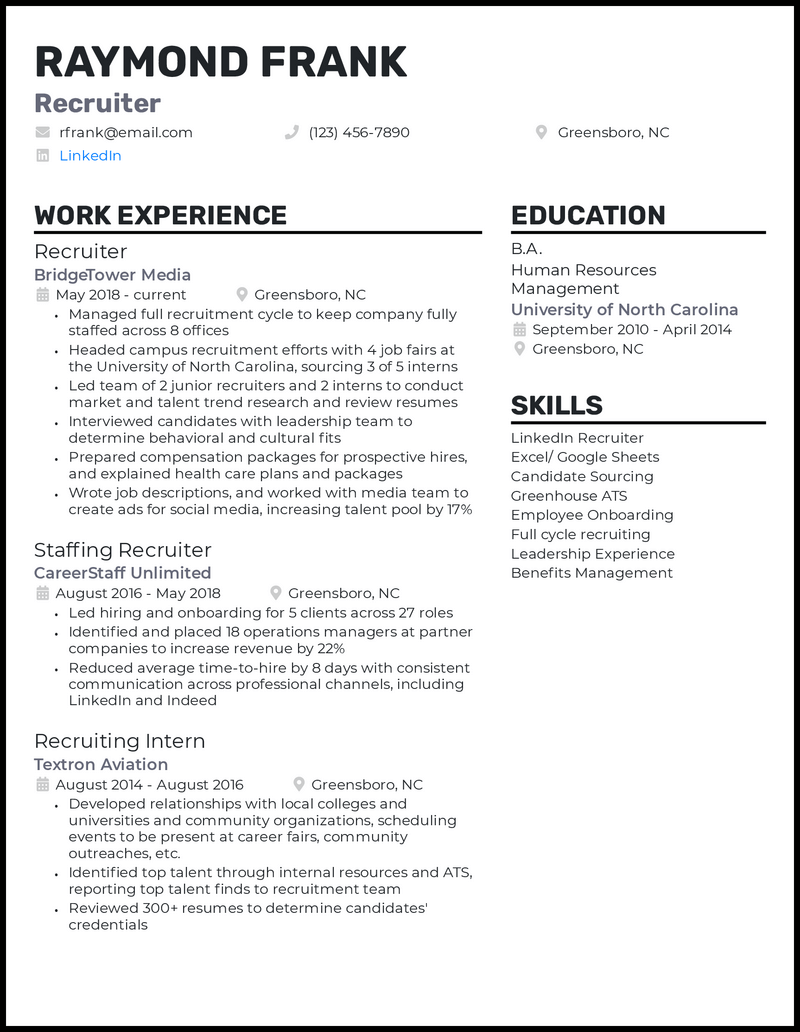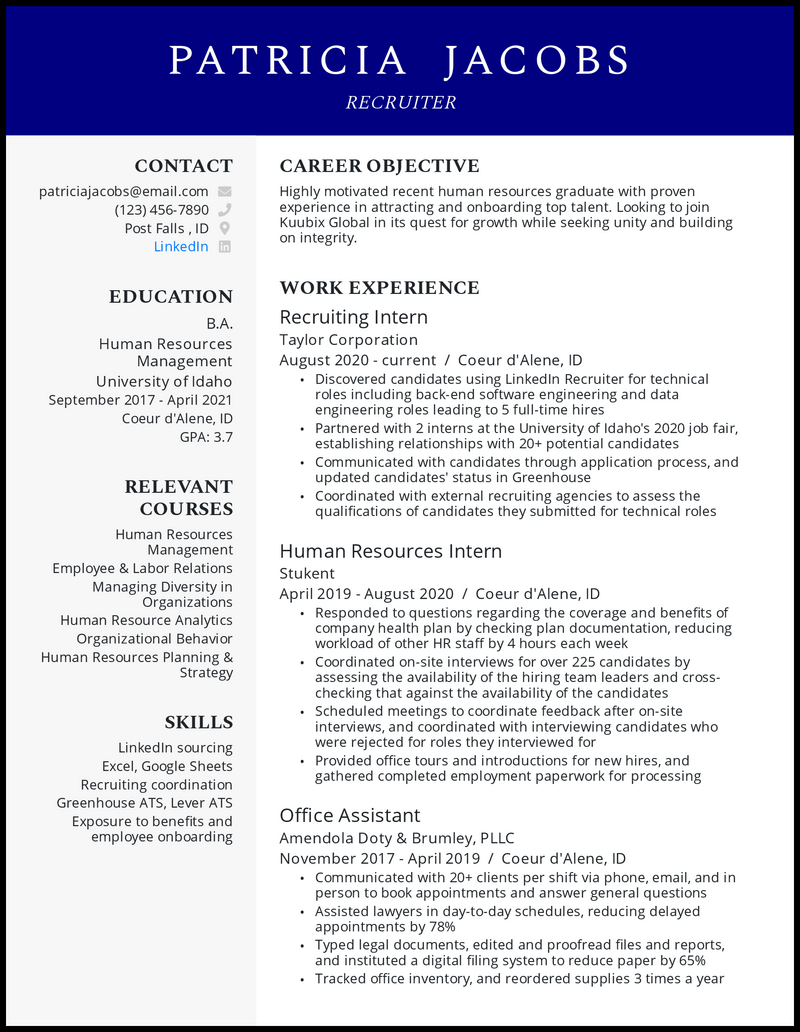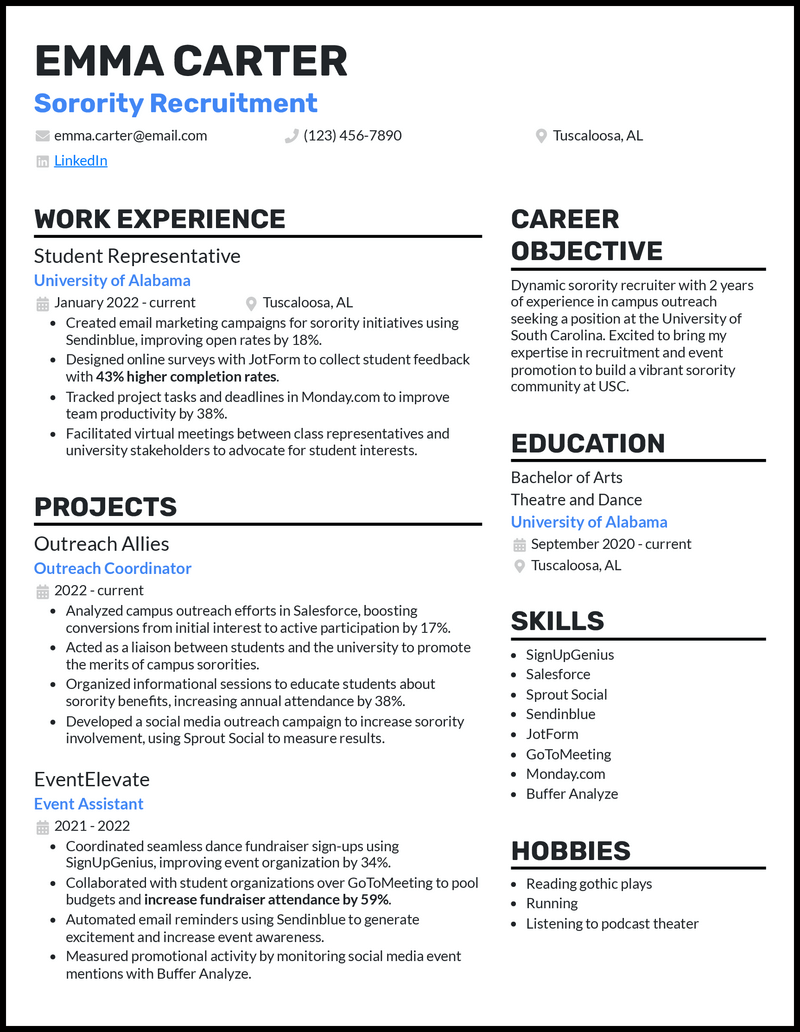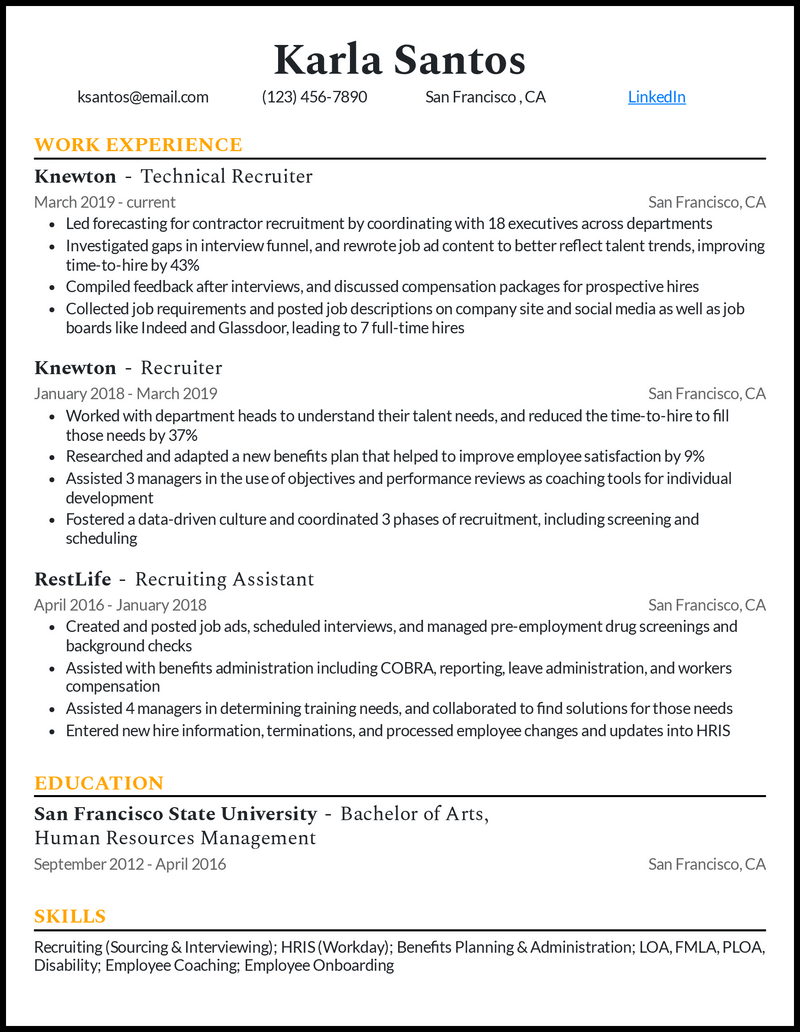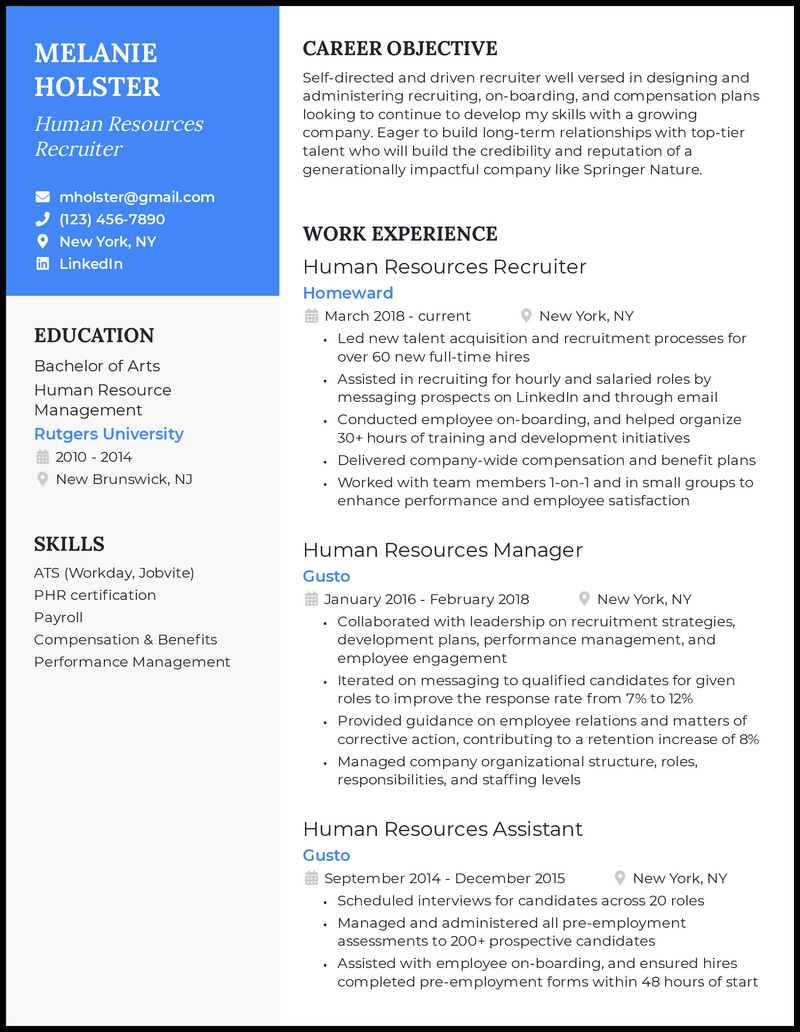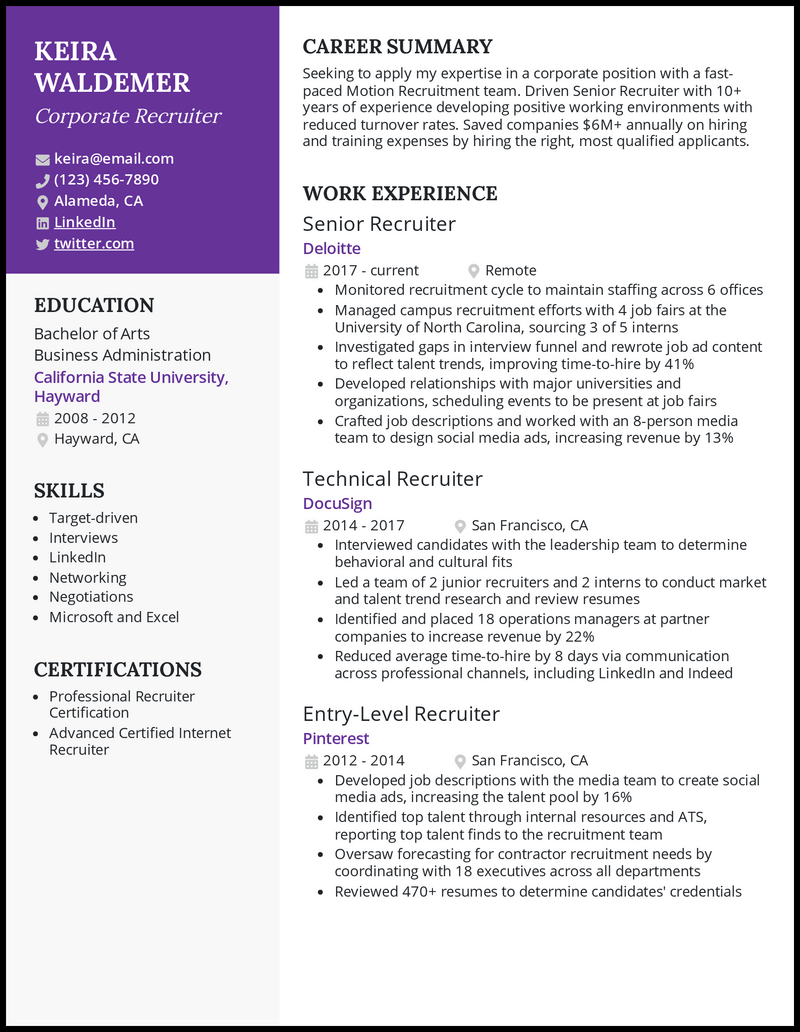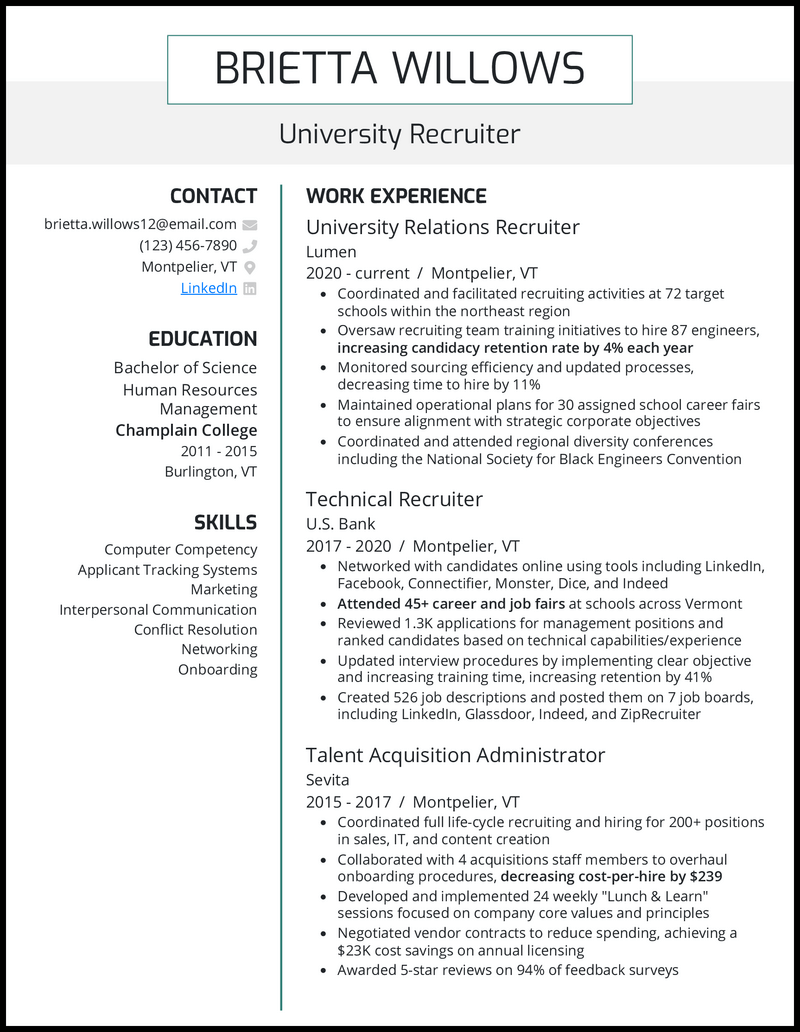When it comes to reviewing resumes, you can spot a great candidate in record time. Although you’ve reviewed hundreds of resumes for the roles you help fill, writing your own resume can be intimidating.
Your recruiter resume needs to quickly demonstrate your skills while being succinct and aesthetically pleasing. It’s a tall order, but we know you’re up to the task!
These free recruiter resume examples will help you put your best foot forward and impress the hiring manager(s) with your expertise.
Flaunting real wins
- Got a track record of making things happen? By using a results-driven approach, instead of only harping on about the proficiencies in the resume skills section, you’re all set to strike a chord with potential employers.
- What feats did you pull off as a recruiter? Now is the moment to brag a bit with metrics, whether percentages, dollar amounts, number of users, or time saved.
- Here’s an example to get you going: Headed campus recruitment efforts with 4 job fairs at the University of North Carolina, sourcing 3 of 5 interns.
Tailor a career objective
- A career objective that mirrors the language and goals of the hiring company could make a big difference in catching the right eyes.
- Your resume objective should spotlight your relevant experience (maybe that recruiting or HR internship that taught you the ropes) and how you intend to streamline the organization’s recruitment practices
- At the top just below the header or on the side column is a prime spot for this power-packed statement. However, less is more here—aim for three sentences max.
Resume format matters
- No matter how stacked your pertinent experience is, nailing that first impression is non-negotiable. Now, it is time to give your senior recruiter resume a format facelift.
- Consider a dual-column design (where your rich work history takes center stage in the broader column, while the slimmer side holds your educational background and skills), a legible font, and white space for better readability.
- Color is good, too, but hold off on those super bright shades. For example, how about something like crimson to spice up the job titles, company names, and your university?
Let loose your skills
- Your executive recruiter resume might just release that much-desired flood of interviews if you zero in on putting your relevant technical expertise in the limelight to show you have what it takes to hit goals.
- See those tools you know inside out, such as Workday, Salesforce, and Zoom? Let them shine in your resume’s skills section. But remember, any other candidate can curate such a list, so do the hiring manager one better by letting them in on how you leveraged the software in your work history, plus the resulting quantified outcomes.
Pack more active verbs
- A polished staffing recruiter resume could open the doors to one of the most exciting chapters in your professional life. Looking for a few pointers on writing it? We’re all for using action words at the beginning of your work history’s bullet points.
- Power words that pack a punch (think utilized, managed, and generated) can turn things around for you because they say you’re proactive; plus, they put your accomplishments in the spotlight, separating you from the lot that only emphasizes their responsibilities.
No to photos
- You probably already know that bias in the hiring process is not uncommon. As Abigail does, you can ensure that it doesn’t come between you and that open role by keeping a photo of yourself out of your campus recruiter resume.
- The little-known truth is that hiring managers can fall prey to unconscious bias, which may see them discriminate against candidates based on their race or appearance. The last thing you want is to join their list of victims because it will cost you the job.
Remain professional
- As an RPO recruiter, you know the cost of looking unprofessional when hunting for a job—it creates a bad first impression and prompts the potential employer to pick anyone but you. Our point? Include a professional email address in your RPO recruiter resume.
- So, instead of partyguy2@email.com or cutiepie@email.com, go with something professional like m.young@email.com. This will take your professionalism to the next level and showcase your attention to detail, which can work to your advantage.
Go big on numbers
- If you want to beat the hundreds of candidates who tossed their hats in the ring alongside you and bag that opportunity, you must make a strong case for why you’re the best person for the job. And how can you do that? Add numbers to your army recruiter resume.
- Yes, phrases with actual data, such as “Engaged with 186 veterans using Soldier for Life resources…” don’t just boost your credibility by showing your impact in past roles; they also help you stand out while making your sales pitch ATS-friendly.
Use one-column layout
- When putting together a freelance recruiter resume, choose a clean and straightforward layout that makes evaluating your qualifications easy — you’ll thank us later.
- The one-column resume layout is your best option here; like Natalie, you can complement it with an easy-to-read font (think Arial, Calibri, or Times New Roman), snappy bullet lists for your work history, and a pop of color highlighting key components. Bolding your name, job title, places of work, and alma mater add visual appeal, so give thought to it as well.
Add related hobbies
- Sororities aren’t just about transforming girls into mature, all-rounded women; they’re a ticket to fun times too. By adding a Hobbies section to your pitch, you come off as a well-balanced prospect the hiring organization would be eager to welcome aboard.
- However, not all your hobbies need a spotlight. If they don’t relate to the job, it’s probably wise to leave them out.
- Our two cents? Include pastimes that flavor your persona, potentially tipping the scales in your favor. For instance, you could share about reading gothic plays, running, and listening to podcast theatre.
Relevant certificates
- Don’t let your hard-earned certifications sit by the sidelines. Flaunting them is a smart move to show you’ve got the chops to nail the job, an excellent strategy to build credibility right at the outset.
- But remember, relevance is critical for these credentials. Otherwise, you risk coming across as someone just padding their recruiting coordinator resume for the sake of it or, worse, a bit thoughtless—certainly not the impression you’re aiming for.
- Worthy mentions include Talent Acquisition Specialty Credential (TASC), SHRM-SCP (SHRM Senior Certified Professional), and Certified Diversity and Inclusion Recruiter (CDR).
Using action verbs
- Incorporating flair into your resume formatting with killer bullet points calls for showing off that you’re an initiator and a results-getter, equipped with a suite of handy soft skills. That’s your cue to let action verbs shine.
- Kicking off each bullet point with a power-packed verb is a smart move to call attention to your competencies like leadership, communication, time management, and creativity.
- So, swap out those lackluster phrases like “helped in” and “was responsible” for punchy verbs that put you in the thick of the action—think compiled, collected, created, and researched.
Highlight career progress
- If you’ve been in the game for a while, there’s no doubt that you take your job pretty seriously. Showcasing your career progression (read, reverse chronological format) is a dead giveaway for any resume template.
- Lead with your most recent senior role and trace your career backward to the junior ones, mapping out the progression in your responsibilities and impacts over time.
- You’re right in thinking that you shouldn’t catalog every role you’ve held. Zero in on three that align closely with the position you’re gunning for, such as HR recruiter, HR manager, and HR assistant.
Dive into projects
- Sure, companies put a premium on hands-on experience. But even if you’ve been around the block and boast a catalog of hobbies or interests, don’t overlook the significance of projects in demonstrating your worth
- For each project, detail your contributions and measurable results. And if it makes sense, throw in a bit about the team size, budget, and timeline—it rounds out the picture.
- “Attended 12+ annual networking events, meeting 155+ job seekers and hires per event” might just be the kind of thing to pique the interest of a recruiter scanning your projects.
Short is indeed sweet
- For a recruiter whose workday is packed with meetings, interviews, and urgent tasks, brevity is key. You know that keeping things short will play to your advantage.
- A one-page resume highlighting your qualifications is exactly what you need for your corporate recruiter resume, which calls for trimming out anything irrelevant.
- To ensure no golden nuggets slide past the recruiter? Right below the header and career objective, break down your work history into three concise sections packed with your big wins. Then, slide your contact details, education, skills, certifications, and hobbies or interests into the side column.
Understand the role
- A candidate that truly gets the gig they’re gunning for? They’re the real deal; no two ways about it. Similarly, a tailored resume could be your ticket in.
- By slipping in job-specific keywords and phrases, you’re doing more than demonstrating your enthusiasm; it signals the extra mile you went to do your homework, an attribute employers cherish.
- Consider this gem, for instance: “Recruited 376 candidates by leveraging multiple tools, including LinkedIn, Glassdoor, ZipRecruiter, and Facebook.” Use similar statements to bring life to the technical mentions in your resume’s skills section.
Being ATS-friendly
- Tons of people throw their hats in the ring for university positions, but several of these applications never make it to human eyes. And the potential reason? Failure to optimize application documents to the applicant tracking system (ATS).
- Now, here’s the lowdown: Stick to the basics. Fancy graphics like images and pie charts, acronyms, and a mishmash of fonts are a big no-no.
- More importantly, dig deeper into the recruiter job description and fish out relevant keywords (think industry terms, certifications, skills, licenses, and technical expertise). Then, sprinkle these gems liberally throughout your application document.
Related resume guides
Writing Your Recruiter Resume

It’s no wonder that the HR occupation is so desirable. According to the US Bureau of Labor Statistics (BLS), the median salary for an HR manager is $126,230 per year, and the demand for these roles is expected to grow seven percent annually (faster than average).
Specifically, people flock to recruiting because it allows them to leave a tangible mark on the company. Whether you’re working at an agency or internally at a company, recruiters have a knack for matching the right people to the right jobs.
More than that, recruiters manage the interview process (for both the candidate and company), work with hiring teams to determine their hiring needs, create job descriptions, and manage offers and negotiations for each person brought into the company.
How can you include all of those responsibilities on a single-page resume? You have so many valuable attributes that it’s a challenge to limit your resume to just one sheet of paper.
These tips will help you cut through the noise and make your resume the strongest it can be for any recruiting role. As a recruiter, you know people are more than their resumes, but a good resume makes a positive impression and gets the hiring manager interested in you.
In short, here’s what you need to do:
- Include the right skills to get past ATS filters and appeal to the hiring manager.
- Get the format right. Your resume has to be readable even at a glance.
- Quantify your impact to prove your demonstrable impact.
- Tailor your resume for each job application to make the case that you’re the right recruiter for the job.

Highlight your recruiter skills
You likely already know this process, but we’ll just recap the steps of a typical resume review process:
- Companies apply filters in their applicant tracking system (ATS) to weed out applicants based on specific keyword matching.
- The hiring manager (an HR leader) reviews the resumes that make it through the ATS filters and reaches out for preliminary phone interviews.
So the goal of the skills section on your resume is to get past both of these steps.
If you were just going to get past the ATS, you would stuff your resume with all of the keywords in the job description. Sadly, that wouldn’t help you pass the second step, since keyword-stuffing raises many red flags for the hiring manager. What do you do?
First, read the recruiter job description. Read their required skills, and if you have those skills, then you should include them. The key here is to include a majority of hard skills, not soft skills.
Soft skills without context fail to offer any new information to the resume reviewer. Hard skills demonstrate your prowess and are more measurable.
However, if you’re just starting out, you can include more soft skills to make up for your lack of technical expertise (you can learn these skills on the job).
Recruiter skills to include on your resume
- Microsoft Excel, Powerpoint, Word
- HR information systems (Workday, Oracle HCM, Zoho, SAP)
- ATS (Greenhouse, Lever, Workable, Breezy HR, BambooHR)
- Sourcing tools (LinkedIn Recruiter, TalenNest, Connectifier)
- Full-cycle recruiting, intakes, sourcing, screening, and evaluating talent
- CRM (Hubspot, Marketo, Hootsuite)
When you’re deciding what to include in your skills section, ask yourself, “Would I be comfortable being interviewed about that skill? Can I demonstrate my abilities?” If the answer to both is “no,” then leave that skill off your resume.
One last thing to note: we’re sure you’ve seen your fair share of candidates embellish skills on their resumes. This is a quick way to get blacklisted from potentially working for that employer, so always be honest about your proficiencies. If you’re not an expert, don’t claim you are; instead, demonstrate your willingness to learn that skill when you create a cover letter.

Make sure your resume format is correct
You know that recruiters have to scan through dozens of resumes before they find the candidates they need. On average, a recruiter spends just over seven seconds reviewing any given resume.
So, make your resume as easy to read as possible. It will help recruiters see that you’re a strong candidate for the role and deserve a phone interview.
How can you do that? Here are some quick tips:
- Keep your resume to one page.
- Break up text into smaller, consumable bullet points.
- Make your resume computer-readable. Avoid using images, icons, or fancy formatting that is hard for a computer to scan.
- Put the title of the role you want under your name. So if you’re applying for a senior recruiter role, you should make your title “senior recruiter.”
- Leave out the objective or summary unless you’re an entry-level candidate (objective) or you have more than a decade of experience (summary)
- Check your resume multiple times for spelling or grammar errors.
All of these points serve one goal: make the job of the person reviewing your resume as easy as possible. Try this experiment—which work experience entry is easier to read quickly?
WRONG—big blocks of text
Ed-tech Company
May 2018 – Present, New York NY
Recruiter
- Identified gaps in the interview funnel and recommended proactive improvements, improving average time-to-hire by 18%. Reported on the usage of LinkedIn Recruiter across junior recruiters and guided them on enhancements resulting in a message to interview rate improvement of 9%. Collected job requirements and posted job descriptions on internal site and job boards like Indeed and Glassdoor, leading to 6 full-time hires.
RIGHT—break long text into bullet points
Ed-tech Company
May 2018 – Present, New York NY
Recruiter
- Identified gaps in the interview funnel and recommended proactive improvements, improving average time-to-hire by 18%
- Reported on the usage of LinkedIn Recruiter across junior recruiters and guided them on improvements, resulting in a message to interview rate improvement of 9%
- Collected job requirements and posted job descriptions on internal site and job boards like Indeed and Glassdoor, leading to 6 full-time hires
Obviously, the second one is easier to scan and absorb in a shorter period of time. Bullet points are the way to go!
Now let’s cover an age-old resume issue: figuring out the objective and summary.

Recruiter resume objective
What’s the difference between a resume objective and a resume summary?
- Resume objective: A way to concisely demonstrate your passion and goals regarding a given role or company.
- Resume summary: A summary of your qualifications (hence the name) for the role to which you’re applying.
We recommend you omit a resume summary unless you have at least 10 years of work history.
You should only include a resume objective if you have a passion for the role or company you’re applying to or are undergoing a career change. If you’re using the same resume objective for multiple applications, you should just exclude it.
You’ve likely seen it when reviewing resumes—a resume objective or summary that’s generic and provides no new information about a candidate’s qualifications.
Objectives and summaries like this take up valuable real estate that could be used for work experience. Don’t waste space by providing generic, unconvincing information.
WRONG—generic, uninformative resume objective
Looking to utilize my extensive experience in full-cycle recruiting to improve the hiring practice of a people-first company.
RIGHT—customized, specific resume objective
Looking to leverage my experience with Greenhouse and LinkedIn Recruiter to help recruit top engineers to serve Stripe’s mission of making payments easy and accessible for small businesses worldwide.

Quantify the impact of your work
our work experience makes or breaks the case for you to get a phone interview. How do you get it right?
Be descriptive and tie your work to demonstrable outcomes for the business where you worked. The best way to make your case that you’re a great fit for a role is through numbers.
The first step is being descriptive. You shouldn’t mention every single task you did, but do be sure to avoid sweeping generalities about your contribution to a project.
For example, saying “worked to improve interviewing efficiency” is not nearly as compelling as “implemented more robust first-stage candidate screenings, increasing the on-site offer rate by 17%”.
WRONG—avoid vague statements
Tech Company
May 2018 – Present, New York NY
Recruiter
- Reviewed applications for all engineering hires
- Conducted initial phone screens
- Sourced new candidates when our applicant funnels were under-performing
- Created job descriptions to use on our website as well as job boards like Indeed
RIGHT—specific contributions with outcomes
Tech Company
May 2018 – Present, New York NY
Recruiter
- Conducted a thorough review of applications for all engineering hires, resulting in a total of 26 full-time hires in 2019
- Improved the initial phone screen process, improving the on-site interview-to-offer rate by 17%
- Monitored candidate funnels and efficiently sourced engineering candidates using LinkedIn Recruiter when they were underperforming, resulting in 11 full-time hires
- Worked with hiring teams to create robust job descriptions and propagate them on job boards like Indeed and Glassdoor, resulting in 6 full-time hires
You’ll notice a formula when talking about work experience. Generally, you should mention the specific work you did and follow it up with a tangible outcome for that work.
Ways to quantify your impact as a recruiter
- How much you improved time-to-hire
- Number of candidates that you reviewed, sourced, or interviewed
- How much you improved the efficiency of the interview process through new processes or screening procedures
- How much you increased employee retention
- How much you improved the candidate interview experience
- How much money you saved by identifying under-performing candidate acquisition channels
Making a case with numbers (even if they’re estimates) is always more convincing, so strive to quantify your impact whenever possible.

Entry-level recruiter resume projects
What should you discuss on your resume for entry-level recruiters who don’t have work experience yet? Anything that will make a convincing case that you’ll be a strong recruiter.
Demonstrate the skills you need to be a great recruiter. Did you do something where you had to organize large groups of people? Coordinate efforts across different groups? Recruit volunteers?
Sample resume projects for entry-level recruiters
- Have you gone to networking events?
- How many people did you connect with and engage in follow-up conversations? Talk about that.
- Have you networked on LinkedIn?
- Recruiters practically live on LinkedIn, so mention your methodology and your performance metrics.
- Did you start a club at college and recruit members?
- As a recruiter, you need the ability to organize groups of people. Talk about how you convinced people to join the club.
- Did you lead a fundraising effort for a local charity?
- Talk about how you were able to recruit volunteers and demonstrate the outcomes of your volunteer efforts.
- Did you start a social media page for a local business?
- Social media capability can be a massive asset for a recruiter! How much interaction did you get on that page? Did you drive any customers to the business?
If you lack relevant projects, then now would be a great time to get involved with one. The projects listed above should inspire you.
Before we move on, we’d like to reiterate our last point: avoid spelling or grammar errors. When recruiters review hundreds of resumes, they’re looking for a quick reason to say “no.” A spelling or grammar error is the fastest, most avoidable reason to get your application rejected.
Don’t let a minor mistake be the reason you don’t get hired, so always check your resume before hitting “submit.”

Customize your resume for each job
We can already hear you groaning about this step; trust us, we know it’s a pain. It’s a lot of work to tailor your resume for each job.
However, we’ve seen time and time again that recruiters get more interviews when they customize their resumes for each application.
How exactly do you customize your recruiter resume, though?
First, read the job description. When reading the job description, do any past projects you’ve worked on come to mind? Even if they’re tangentially related, you’ll stand out amongst the sea of applicants by including them.
Then, include any skills you have relevant to what they’re looking for in the job description. Based on the type of job you’re applying for, you want to make your experience relevant to that particular job.
Here are some ways you might do that for various recruiter job titles.
Technical recruiter resume tips
- Have you worked on sourcing or evaluating for roles that require some type of technical knowledge?
- If you haven’t worked on engineering roles in the past, that’s okay!
- Try to highlight the technical skills required for jobs you’ve done previously.
- Demonstrate your interest and knowledge in the engineering field. Did you learn some basic programming? That would be a huge asset for technical recruiter roles.
Corporate recruiter resume tips
- Demonstrate that you understand how hiring works from end to end within one company.
- As opposed to a staffing recruiter, you want to show off your breadth of recruiting experience across all aspects of hiring.
- Highlight your work across various aspects of the hiring process. From drafting job descriptions to sourcing to screening, you want to show you can own the recruiting cycle for roles within a single company.
Staffing recruiter resume tips
- Companies typically hire recruiting agencies to help them with their hard-to-fill roles.
- Have you worked on particularly challenging roles where extensive requirements were hard to find?
- How did you find candidates for these roles? Talk about your methodology and outcomes.
- An extensive network within a specific specialty is extremely valuable for a staffing recruiter.
- For example, if you have an extensive network of accountants, talk that up on your resume.
Recruitment manager resume tips
- If you have management experience already, talk about the size of the teams you managed and the outcomes for your team while you were in charge.
- Be aware that good companies want to hire managers who take an interest in their employees’ career progressions. Can you demonstrate this?
- If you lack management experience, demonstrate ownership of projects on which you’ve worked.
- For example, as opposed to saying “worked on projects XYZ,” say something like “owned the development and implementation of project XYZ”

Key takeaways
There you have it. You’ve read some proven recruiter resume examples to help you put your best foot forward in the application process! Here’s a quick summary of the expert resume tips you should follow:
- Include a majority of hard skills in the “skills” section, and only include those you’d be comfortable talking about in an interview.
- Keep your resume to one page. Avoid fancy formatting that would be hard for a computer to read.
- Don’t use a resume objective or summary unless you can customize them to the role for which you’re applying.
- Be specific when talking about your contribution and quantify, whenever possible, the outcome of that project.
- Customize your resume for each job application.
Applying for jobs can be a soul-draining process at times, and with a great resume comes great responsibility. So congrats—you took a huge first step by researching how to create your resume!
The next step is creating your resume, which you can do using our resume builder which allows you to adjust formatting and get AI-powered tips. Once your resume is finished, use our resume checker to scan for errors and suggest improvements. You got this!




